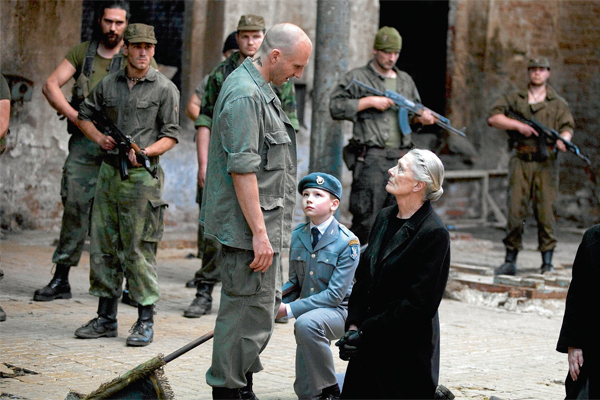CORIOLANUS (M)
When: Now showing
Where: General release
Imagine if the recent Rudd-Gillard leadership spill had gone just a little further. Rudd has not only lost his role as foreign minister; he has been ousted from the ALP and forced to move to the outback. For a while, he lies low, licking his wounds. But soon enough, he pops up on our TV screens again, having taken over from Pauline Hanson as leader of a newly reignited One Nation party, and he’s gearing up to take over the country in a military coup.
The reason a storyline like this is so fantastical is that we live in 2012, rather than in Shakespeare’s time.
What is wonderful about this ballsy new screen version of Coriolanus is that we see an incredible political plot unravel against the backdrop of television screens, parliament and public protests, with characters dressed in business suits and spectacles on the government’s side, and in khaki fatigues on the guerrilla enemy’s side.
It’s a similar approach to Baz Luhrmann’s 1996 Romeo and Juliet, but with a hell of a lot more grit, bloodshed and smarts.
This is an impressive directorial debut from Ralph Fiennes, who also acts in the title role and is the film’s producer. With the talents of cinematographer Barry Ackroyd (The Hurt Locker), Coriolanus is shot in Belgrade as a stand-in for an otherworldly, alien Rome.
No expense is spared in sourcing top actors for this production, important as the play is so performance-driven.
A shudderingly good performance by Vanessa Redgrave as the power and glory-seeking mother shows how manipulation behind the scenes and the calculated use of a woman’s emotional plea can change the course of history. An equally impressive Gerard Butler, as insurgent leader Tullus Aufidius, is measured and almost gentle in parts, receiving admiration from even his enemy Coriolanus – “He is a lion I am proud to hunt”. Brian Cox is also admirable as the tragic Menenius, who understands the need for tact to avoid an uprising.
Shakespeare’s words allow for a full expression of Fiennes’ acting talents. “I banish you,” he bellows during a televised debate, disgusted by how easily his people are swayed by gossip and propaganda.
Unfortunately for our heroes and heroines, pride ultimately leads to their downfall – be it Coriolanus’ scornful superiority over the plebeians or his mother’s heralding of glory over survival.
But this is certainly a movie to be proud of. Expect to enjoy Shakespeare like never before.

















